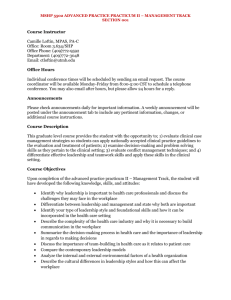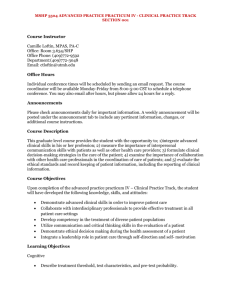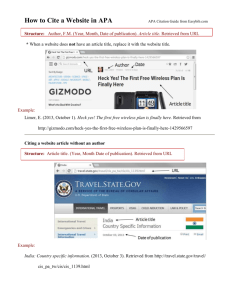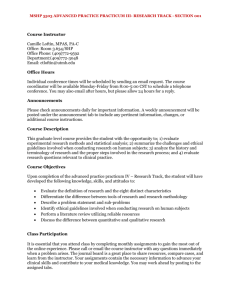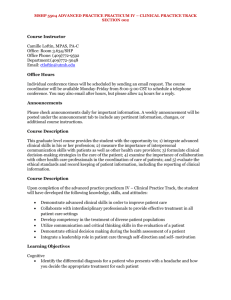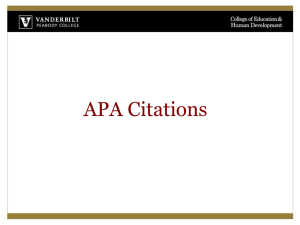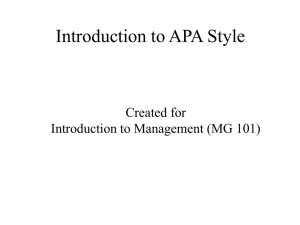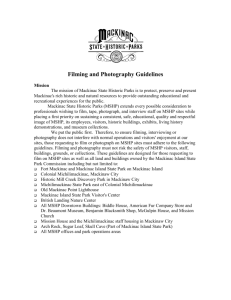MSHP 5501 ADVANCED PRACTICE PRACTICUM I * EDUCATION
advertisement
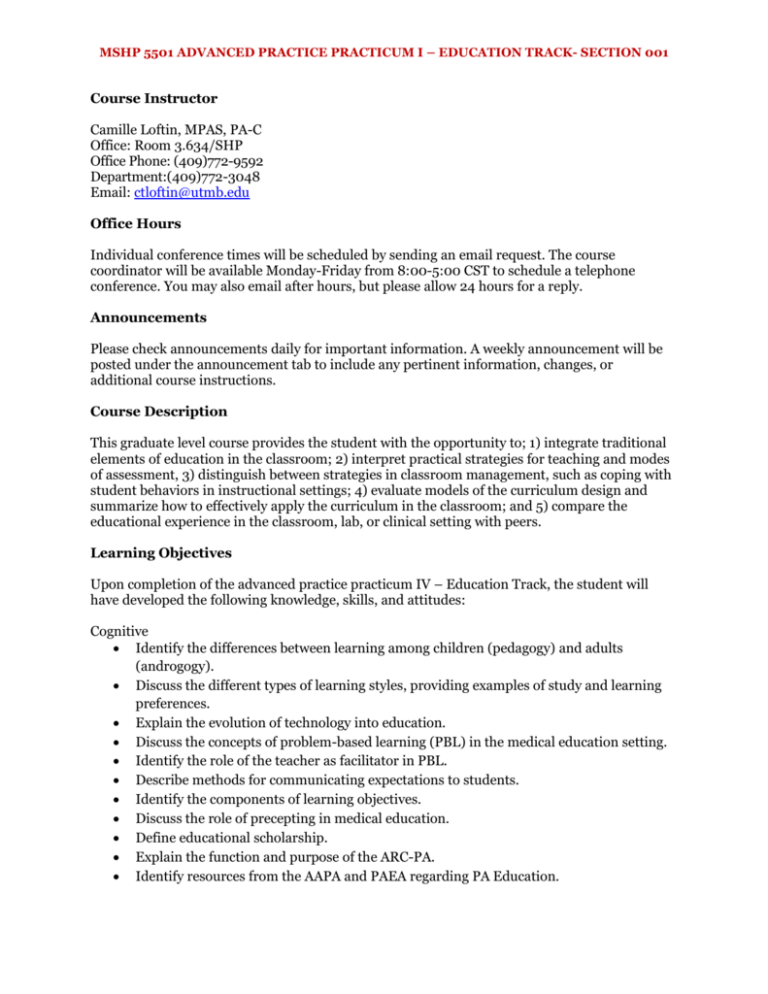
MSHP 5501 ADVANCED PRACTICE PRACTICUM I – EDUCATION TRACK- SECTION 001 Course Instructor Camille Loftin, MPAS, PA-C Office: Room 3.634/SHP Office Phone: (409)772-9592 Department:(409)772-3048 Email: ctloftin@utmb.edu Office Hours Individual conference times will be scheduled by sending an email request. The course coordinator will be available Monday-Friday from 8:00-5:00 CST to schedule a telephone conference. You may also email after hours, but please allow 24 hours for a reply. Announcements Please check announcements daily for important information. A weekly announcement will be posted under the announcement tab to include any pertinent information, changes, or additional course instructions. Course Description This graduate level course provides the student with the opportunity to; 1) integrate traditional elements of education in the classroom; 2) interpret practical strategies for teaching and modes of assessment, 3) distinguish between strategies in classroom management, such as coping with student behaviors in instructional settings; 4) evaluate models of the curriculum design and summarize how to effectively apply the curriculum in the classroom; and 5) compare the educational experience in the classroom, lab, or clinical setting with peers. Learning Objectives Upon completion of the advanced practice practicum IV – Education Track, the student will have developed the following knowledge, skills, and attitudes: Cognitive Identify the differences between learning among children (pedagogy) and adults (androgogy). Discuss the different types of learning styles, providing examples of study and learning preferences. Explain the evolution of technology into education. Discuss the concepts of problem-based learning (PBL) in the medical education setting. Identify the role of the teacher as facilitator in PBL. Describe methods for communicating expectations to students. Identify the components of learning objectives. Discuss the role of precepting in medical education. Define educational scholarship. Explain the function and purpose of the ARC-PA. Identify resources from the AAPA and PAEA regarding PA Education. MSHP 5501 ADVANCED PRACTICE PRACTICUM I – EDUCATION TRACK- SECTION 001 Discuss methods used to evaluate and assess learning in the clinical and academic setting. Affective Recognize the challenges of teaching adult learners. Appreciate the preparatory requirements of curricula development. Psychomotor Compile a set of learning objectives for a “lecture.” Create a Teaching Philosophy for your Educational Portfolio. Develop one section of a course including objectives, lecture topics, resources, and evaluation methods. Class Participation It is essential that you attend class by completing monthly assignments to gain the most out of the online experience. Please call or email the course instructor with any questions immediately when a problem arises. The journal board is a great place to share resources, compare cases, and learn from the instructor. Your assignments contain the necessary information to advance your clinical skills and contribute to your medical knowledge. You may work ahead by posting to the assigned tabs. Graded Components Assignments 12 x 50 points each Journal Posts 8 x 50 points each Total points 600 400 1000 End of Course Survey Grading Scale 1000-900 900-800 800-700 500-700 A B C F Pass/Fail Grading Rubric To be awarded maximum points the following must be completed: Exceptional (A) Meet Expectations (B) Includes critical thinking and analytical content and insight Follows APA format exactly Some critical thinking and analytical content and insight Follows APA format with some minor corrections Needs Improvement (C) Little critical thinking and analytical content and insight included Does Not Meet Minimum Requirements (F) No critical thinking and analytical content and insight included Follows APA format with many corrections Does not follow APA format MSHP 5501 ADVANCED PRACTICE PRACTICUM I – EDUCATION TRACK- SECTION 001 Late Assignments Failure to turn in any assignment will result in a 10% deduction in grade for being late, followed by a 10% per day penalty thereafter. Academic Integrity Academic dishonesty includes, but is not limited to, cheating, plagiarism, collusion, the submission for credit of any work or materials that are attributable in whole or in part to another person, taking an examination for another person, and any act designed to give unfair advantage to a student or the attempt to commit such an act. Procedures to be followed in the event of alleged academic dishonesty are described in the Rules and Regulations of the Board of Regents of The University of Texas System, and the SHP Student Handbook found at http://shp.utmb.edu. Alleged academic dishonesty issues should be reported to the Associate Dean for Academic and Student Affairs. Citation Requirements You must use APA 6th edition to cite all sources. Use 12 font, Times New Roman, one inch margins. Please refer to the: American Psychological Association. (2010). Publication manual of the American Psychological Association (6th ed.). Washington, DC: APA Press. ISBN: 978-1-4338-0561-5 Required Textbooks There is no required textbook for this track; however, there are online resources provided. Assignments Phase I: Educational Theories Readings: Russell, S. (2006). An Overview of Adult Learning Processes: Adult-Learning Principles. Medscape. Retrieved from: http://www.medscape.com/viewarticle/547417_2 Smith, M. K. (2002). Malcolm Knowles, informal adult education, self-direction and andragogy', the encyclopedia of informal education, www.infed.org/thinkers/etknowl.htm. Giles, E., Pitre, S., & Womack, S. Multiple Intelligences and Learning Styles. Retrieved from http://projects.coe.uga.edu/epltt/index.php?title=Multiple_Intelligences_and_Learnin g_Styles Learning-Theories. (2008). Index of learning theories and models. Retrieved from http://www.learning-theories.com/ MSHP 5501 ADVANCED PRACTICE PRACTICUM I – EDUCATION TRACK- SECTION 001 Marcy, V. (2001). Adult learning styles: How the VARK learning style inventory can be used to improve student learning. Perspective on PA Education, 12(2), 117-120. Retrieved from http://www.paeaonline.org/index.php?ht=action/GetDocumentAction/i/25142 Read Teaching on the Run 2 located under the Resources Tab at http://med.fsu.edu/index.cfm?page=facultyDevelopment.clinicalFaculty Assignment 1: In 2-3 pages, discuss the differences between learning among children (pedagogy) and adults (androgogy). Assignment 2: Choose 2 learning theories (Behaviorism, Cognitivism, Constructivism, and Humanism). In 1-2 pages compare and contrast those theories. Journal Post 1: Complete the VARK Learning Style Inventory at www.vark-learn.com. Review and summarize your results. How will knowledge of learning types affect your teaching? Journal Post 2: How do you think technology has impacted adult education? Journal Post 3: Discuss how technology can be used in the classroom, especially with an increase in class size. Phase II: Physician Assistant Student Education Readings: Competencies for the Physician Assistant Profession. Retrieved from http://www.paeaonline.org/index.php?ht=a/GetDocumentAction/i/113465 Accreditation Review Commission on Education for the Physician Assistant, Inc. found at http://www.arc-pa.org/ Comparison of ARC-PA Accreditation Standards for Physician Assistant Education, 4th Edition (2010), To the Competencies for the Physician Assistant Profession (2005) http://www.arcpa.org/documents/Comparison%20of%20Competencies%202005%20to%20Stds%204t h%20%20edition%20August%202010.pdf Assignment 3: In 2-3 pages summarize the purpose of PA education competencies including a discussion about 3 of the six core competencies. Provide examples in your discussion. Assignment 4: In 1-2 pages discuss the purpose of the ARC-PA. Why is accreditation important in PA education? Assignment 5: In 2-3 pages explain the differences between ARC-PA Standards of Accreditation and Competencies for the PA Profession. Journal Post 4: What is your position on Postgraduate Education Programs? How does the accreditation process work for these programs? Did you attend a postgraduate program? MSHP 5501 ADVANCED PRACTICE PRACTICUM I – EDUCATION TRACK- SECTION 001 Phase III: Teaching Readings: Read Teaching on the Run Series (1, 3-7) located under the Resources Tab at http://med.fsu.edu/index.cfm?page=facultyDevelopment.clinicalFaculty Read pages 12-18 of the article: Walker, A. & Leary, H. (2009). A Problem Based Learning meta analysis: Differences across problem types, implementation types, disciplines, and assessment levels. The Interdisciplinary Journal of Problem-based Learning, 3(1), 12-43. Retrieved from http://docs.lib.purdue.edu/cgi/viewcontent.cgi?article=1061&context=ijpbl Desirable Characteristics of Written Cases for Facilitated Small Group Learning under the teaching tab at http://med.fsu.edu/index.cfm?page=facultyDevelopment.clinicalFaculty Writing Objectives: Rational and Strategies Powerpoint under the Planning Tab at http://med.fsu.edu/index.cfm?page=facultyDevelopment.clinicalFaculty A Patient Centered Approach to the One Minute Preceptor under the Teaching Tab at http://med.fsu.edu/index.cfm?page=facultyDevelopment.clinicalFaculty Irby, D. M. Effective clinical teaching and learning. Retrieved from http://www.med.cmu.ac.th/secret/meded/ct2.htm Assignment 6: In 2-3 pages, discuss the concept of problem-based learning (PBL) in the medical setting. Include roles of the facilitator and learner, formats, case writing, and how to assess/evaluate the learners. Assignment 7: Chose a topic (medical or nonmedical) and develop 5 cognitive, 2 affective, and 1 psychomotor learning objective as if you were preparing a syllabi or lecture. Use your learning resources to determine structure, verbiage, etc. After the list of objectives, briefly explain in 1-2 paragraphs the purpose of your affective and psychomotor learning objectives. Assignment 8: In a 2-3 page paper, discuss how instructors and preceptors can effectively communicate expectations to a student. How do we evaluate completion of those expectations? Incorporate evaluation and assessment methods used in education highlighting advantages and disadvantages of those methods (i.e. multiple choice exams, practical exams, rubrics, facilitator evaluations, etc.). Journal Post 5: Identify the goals and potential challenges to clinical precepting. What are possible solutions? Use personal experiences if you have precepted. Journal Post 6: Discuss your thoughts about the use of simulation in education. Simulation includes patient actors as simulators, mannequins, and computerized systems. Journal Post 7: Discuss and compare different teaching styles (lectures, PBL, simulation) and which one you feel more comfortable with. Phase IV: Educational Development MSHP 5501 ADVANCED PRACTICE PRACTICUM I – EDUCATION TRACK- SECTION 001 Reading: Ohio State University. (2005). Faculty & TA development: Developing a teaching portfolio: Guidance on writing a philosophy of teaching statement at: http://ucat.osu.edu/portfolio/philosophy/Phil_guidance.html Assignment 9: you? In 1-2 pages, discuss what the term “educational scholarship” means to Assignment 10: In 2-3 pages, discuss methods to evaluate teachers (instructors and preceptors). What are the roles of students in this evaluation? Do teachers need to be “experts?” Assignment 11: With the knowledge that you have gained throughout this course, compile a Teaching Philosophy. This is a living document that you should keep and modify continually. You can include this in your Educational Portfolio. Assignment 12: You have accepted a part-time position as an adjunct faculty instructor at a local PA School. While you do not coordinate the entire “Clinical Medicine” course, you have been asked to develop one section (i.e. topic of your choosing such as Cardiology, GI, Women’s Health, etc.). Develop learning objectives, identify texts/resources, assign lecture topics (include hours for the topic), and how you plan on evaluating your section. Include the evaluation component (i.e. rubric, a few exam questions, a skill-set, etc.). Journal Post 8: After completing this course, what are your overall perceptions of PA education? What are your thoughts about teaching future healthcare providers?
